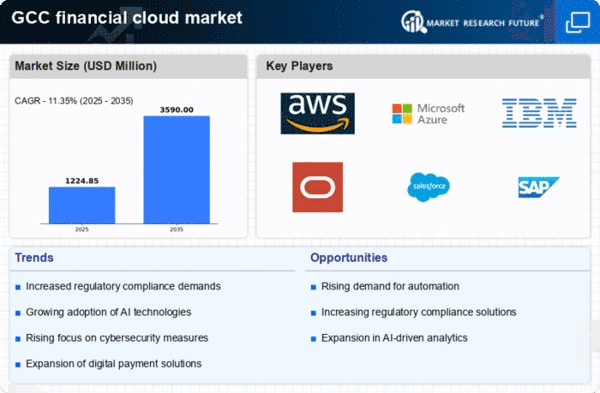Cost Efficiency and Scalability
Cost efficiency remains a critical driver for the financial cloud market in the GCC. Organizations are increasingly recognizing the financial benefits of migrating to cloud-based solutions, which can reduce infrastructure costs and operational expenses. The ability to scale resources according to demand allows financial institutions to optimize their expenditures while maintaining service quality. Reports indicate that companies can save up to 30% on IT costs by leveraging cloud technologies. This trend is particularly relevant in the financial cloud market, where firms are seeking to enhance their competitive edge through cost-effective solutions. As more businesses transition to the cloud, the market is expected to grow in response to these economic pressures.
Integration of Advanced Technologies
The integration of advanced technologies such as artificial intelligence (AI) and machine learning (ML) is emerging as a key driver for the financial cloud market in the GCC. These technologies enable financial institutions to analyze vast amounts of data, automate processes, and enhance decision-making capabilities. The financial cloud market is witnessing a growing interest in solutions that incorporate AI and ML, as they offer significant advantages in risk assessment, fraud detection, and customer service. As organizations seek to harness the power of these technologies, the market is expected to expand, with a focus on developing intelligent cloud solutions that cater to the specific needs of the financial sector.
Rising Demand for Digital Transformation
The financial cloud market is experiencing a notable surge in demand driven by the ongoing digital transformation across various sectors in the GCC. Organizations are increasingly seeking to modernize their operations, enhance customer experiences, and improve efficiency through cloud-based solutions. This shift is reflected in the GCC's financial services sector, where investments in digital technologies are projected to reach $20 billion by 2025. As businesses recognize the potential of financial cloud solutions to streamline processes and reduce operational costs, the market is likely to expand further. The financial cloud market is thus positioned to benefit from this trend, as companies prioritize agility and innovation in their service offerings.
Regulatory Compliance and Risk Management
In the GCC, the financial cloud market is significantly influenced by the stringent regulatory environment that governs financial institutions. Compliance with regulations such as anti-money laundering (AML) and data protection laws necessitates robust cloud solutions that can ensure data integrity and security. Financial institutions are increasingly adopting cloud technologies to enhance their compliance capabilities, which is expected to drive market growth. The financial cloud market is likely to see a rise in demand for solutions that offer advanced analytics and reporting features, enabling organizations to manage risks effectively. As regulatory requirements evolve, the market may witness further innovations tailored to meet these challenges.
Enhanced Customer Experience through Innovation
The financial cloud market is also being propelled by the need for enhanced customer experiences. Financial institutions in the GCC are increasingly leveraging cloud technologies to offer innovative services such as personalized banking, real-time analytics, and mobile access. This shift towards customer-centric solutions is reshaping the financial landscape, as organizations strive to meet the evolving expectations of their clients. The financial cloud market is likely to see a rise in demand for platforms that facilitate seamless interactions and provide valuable insights into customer behavior. As competition intensifies, the focus on delivering superior customer experiences will continue to drive innovation within the market.

















Leave a Comment